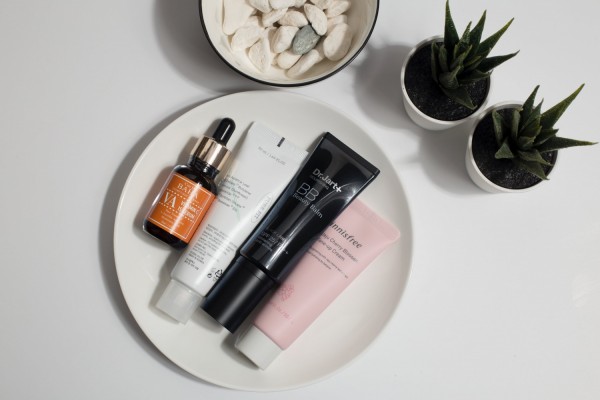Developing an effective skincare routine can be challenging, especially with the variety of products on the market. If you are a beginner who just bought more than one skincare product, a few questions might arise: what goes on first, and what goes on last? Does the order of application even matter?
The answer for the latter is yes, according to dermatologists and experts. The order of application matters as it affects the effectiveness of the products that you are using.
 (Photo : Pexels/Elena Druzhinina)
(Photo : Pexels/Elena Druzhinina)Flatlay of skincare products on a white round plate.
Celebrity dermatologist and founder of Lancer Skincare, Dr. Harold Lancer, whose clients include Kim Kardashian, Margot Robbie and Ellen DeGeneres, told Glamour that a correct order of skincare application is vital to keeping the skin healthy.
"Everyone has unique skin needs, and creating your own skincare 'cocktail' will give you the results you are looking for," Lancer said. "Properly applying and layering products means better, more noticeable results in the long run. If you have been using a product and not seeing the results you were hoping for, you could be applying it at the wrong time of day, or in the incorrect order."
The rule of thumb is to layer products from the thinnest consistency to the thickest as lighter formulas are absorbed by the skin more quickly.
"My general recommendation is that any thin products like serums or liquid treatments, go first," Lancer said.
Dr. Mitchel P. Goldman, a board-certified dermatologist and founder of Cosmetic Laser Dermatology, told Health that this strategy enhances product absorption and prevents occlusion, where thicker products create a barrier that hinders ingredient absorption into your skin.
Here's a simple, beginner-friendly guide to layering daytime skincare based on the recommendations of dermatologists and experts.
1. Cleanser
The first step in the morning during your skincare routine is to cleanse to remove nighttime dirt or oil that clogs pores.
Dr. Noelani Gonzalez, a board-certified dermatologist specializing in cosmetic dermatology, explained why you should first wash your face in the morning.
"Bacteria can accumulate throughout the night and, also, you should prime your skin by cleansing it for your morning skincare routine, not to mention to remove your nighttime creams and serums used the night before," Gonzalez told Byrdie.
2. Toner
After cleansing, the next step is toning, which helps to balance the pH level of the skin and eliminate any remaining impurities.
"A toner is best used after cleansing the skin to help remove leftover residue and lock in moisture," board-certified dermatologist Dr. Dustin Portela told CeraVe.
3. Antioxidant serum
The third step is to apply an antioxidant serum. Vitamin C or E serums, known for their antioxidant properties, shield the skin from damage caused by unstable molecules called free radicals, as noted by Healthline.
This step aids in minimizing redness, wrinkles, and skin damage.
4. Acne treatment (Active ingredient)
This step is optional, but if you are dealing with blemishes or acne, consider incorporating into your routine skincare products containing active ingredients.
One example is niacinamide, known for its acne-treating properties and ability to nourish and safeguard the skin.
5. Moisturizer
The second to the last step you need in your daytime skincare routine is a moisturizer.
Lucy Hilson, co-founder of SKN Rehab, told Glamour that a moisturizer helps maintain a beautiful and healthy complexion by enhancing the skin's barrier function and sealing in the benefits of active ingredients.
6. Sunscreen/SPF
Applying sunscreen is the last crucial step of a successful morning skincare routine. Dermatologists and skincare professionals advise against skipping this step as the use of sunscreen to reduce the short- or long-term harm caused by the sun's rays is highly supported by scientific studies.
According to an article reviewed by dermatologist and professor Dr. Anna Lien-Lun Chien of the Johns Hopkins University School of Medicine, UVB rays, a specific portion of ultraviolet (UV) light, are a contributing factor to sunburns and skin cancer. Sunscreen helps shield skin from possible sunburn, skin cancer and premature aging caused by the sun's harmful rays.
Hilson also told Glamour: "SPF should always be applied last every day - even during the winter months. A makeup product containing SPF does't count. Always use a broad spectrum sunscreen to ensure you are protecting the skin from UVA and UVB rays. This is particularly important when using high potency ingredients such as AHA/BHA acids and retinol as the skin is more prone to sun damage."

